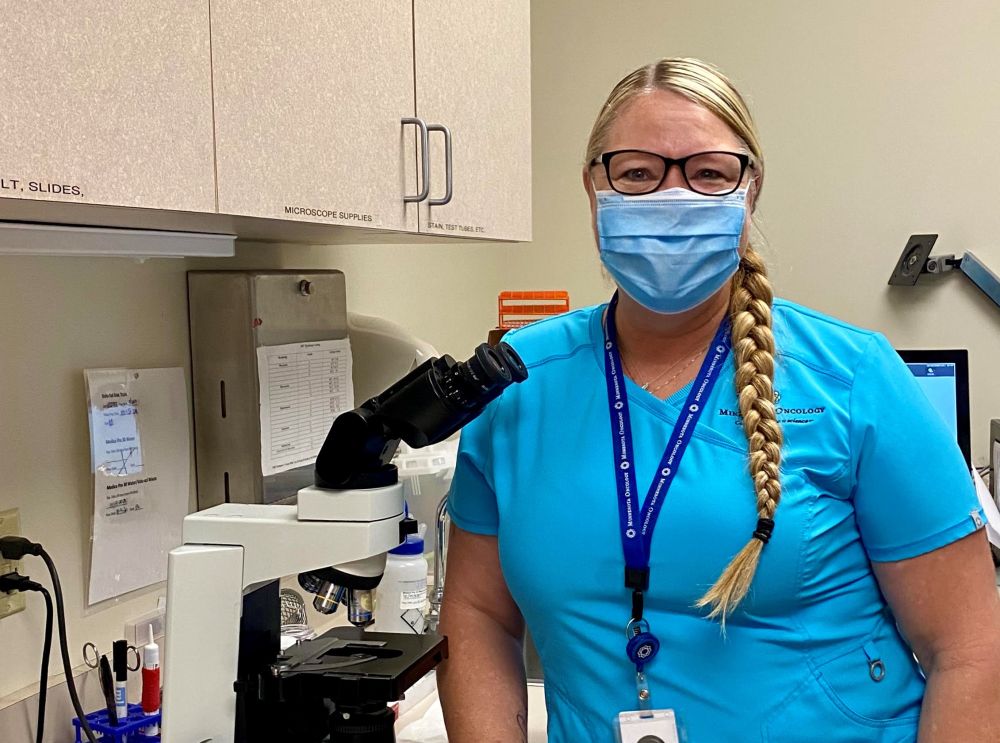Medical Laboratory Professionals Week, April 18-24, 2021, is an annual celebration of medical laboratory professionals and pathologists who play a vital role in health care and patient advocacy!
Did you know that 10 of Minnesota Oncology's clinics have an on-site laboratory? Each laboratory is staffed with skilled personnel who perform various roles.
Who works in the on-site labs?
The Minnesota Oncology Laboratory team is staffed with Associate Degree Medical Laboratory Technicians and Bachelor Degree Medical Technologists. We also have Medical Assistants and Phlebotomists on staff. The lab team is led by Lab Manager Therese Sumstad. Rachel Zimmerman and Patrice Vandelinde supervise laboratory services at Minnesota Oncology.
Technicians, Technologists, and some phlebotomists are certified through examination by American Society for Clinical Pathology (ASCP). There used to be another certifying board named National Credentialing Agency (NCA) which credentialed a lab tech as CLT or CLS. The two boards merged in 2009 and now we are referred to as MLT or MLS.
How are the labs accredited?
Medical laboratories are accredited for different complexity levels, waived, moderate or high complexity. Our laboratory is accredited by COLA, Commission of Office Laboratory Accreditation, for high complexity testing. COLA accreditation means your clinical laboratory is in compliance with CLIA and is recognized by the Joint Commission.
What types of tests do the labs perform?
High complexity tests include those that require clinical laboratory expertise beyond normal automation to perform. The white blood cell differentials that our lab reports are high complexity, which means that we can report immature or abnormal cells. Differentials are done by microscopy with a stained blood slide and can only be performed by Medical Lab Technicians or Medical Technologists. Testing that is classified as waived, such as dipstick urinalysis or IStat Creatinine can be performed and resulted by MA’s or phlebotomists who have been trained and deemed competent.
At our St. Paul Cancer Center lab, we have larger analyzers that run testing that isn’t done at the other nine sites. The testing St. Paul runs is chemistry testing such as metabolic profiles that include electrolytes, kidney and liver function. We also perform tumor marker testing that our physicians use to monitor a patient’s status. St. Paul performs protein electrophoresis, immunophenotyping, free light chains and quantitative immunoglobulins which all have to do with monoclonal gammopathies such as Multiple Myeloma.
Why is an onsite lab better for the patients?
Offering a fast turnaround time for certain tests such as a CBC (ANC) or IStat Creat (kidney function) that allow providers to make clinical decisions about a patient’s treatment is crucial. Other testing does take longer to perform, and the patient portal, Navigating Care is a great communication tool for a patient to review their results after the provider reviews and releases them.
Other testing that we don’t perform in house gets sent to other area reference labs.
We have couriers that come to our sites each day and pick up the specimens we have drawn and processed. The courier transports the specimens according to the specified temperature – Ambient Refrigerated or Frozen.
We are here to provide quality and convenient services to our physicians and their patients. We are happy to be a part of our patients' care team at Minnesota Oncology.
To learn more about Minnesota Oncology's Laboratory Services, listen to this podcast episode: https://bit.ly/31X0v4t




